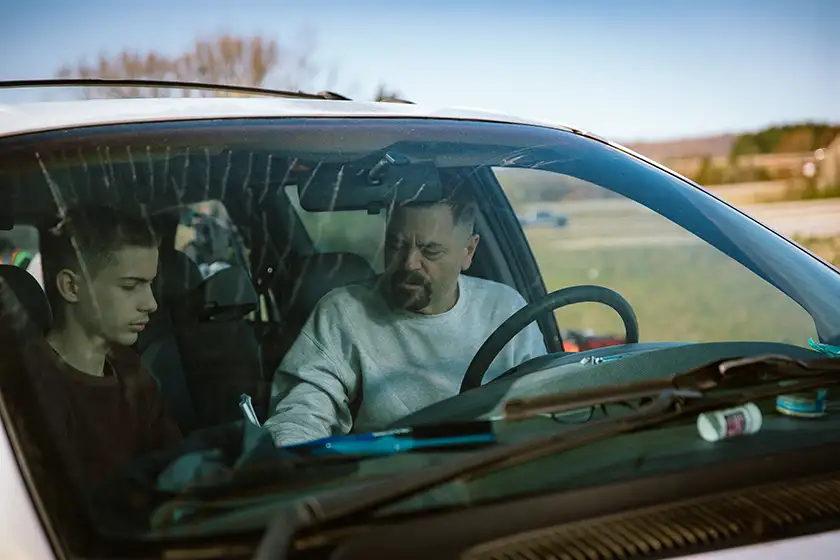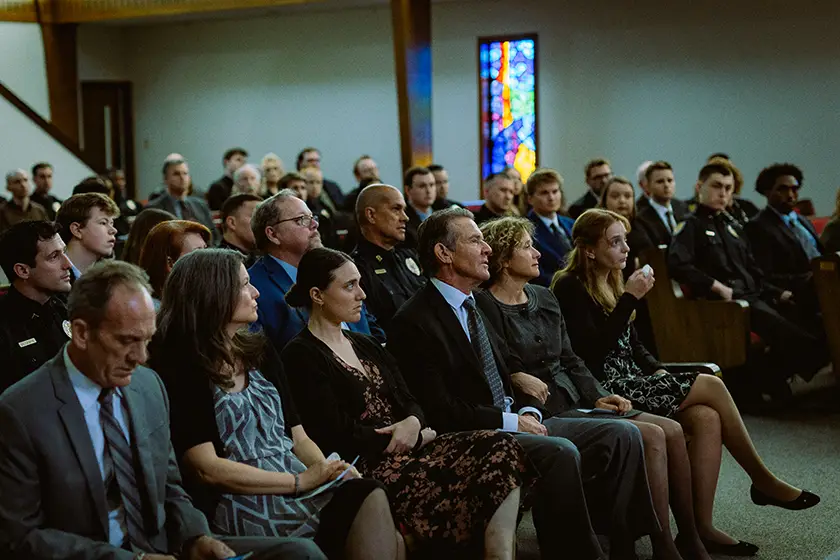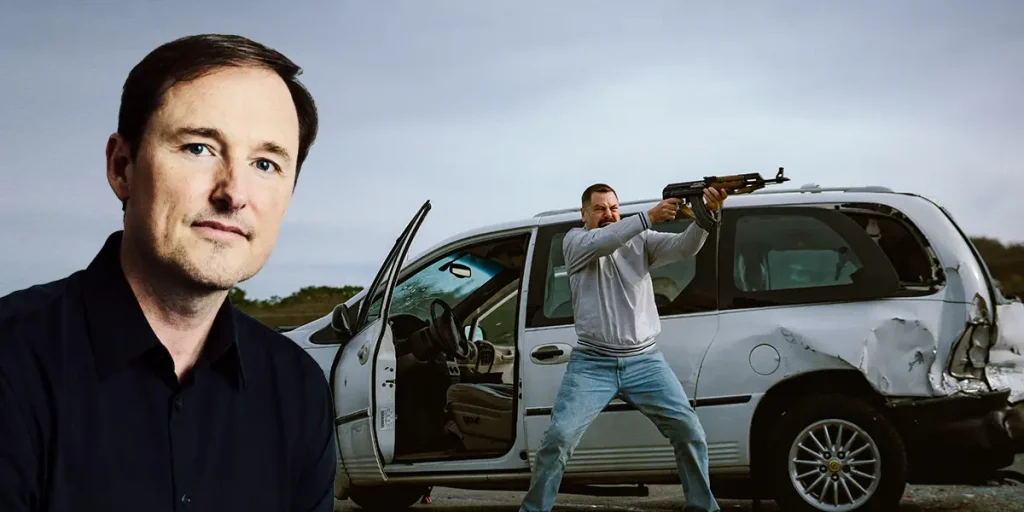We interview writer-director Christian Swegal about his quietly intense dramatic feature Sovereign, featuring Nick Offerman and Dennis Quaid.
Christian Swegal’s Sovereign tells the story of a fanatical dad named Jerry Kane (Nick Offerman, of Mission Impossible: The Final Reckoning), his teenage son Joe (a now-grownup Jacob Tremblay, of Room), and their very peculiar lifestyle. But it also intertwines it with the lives of police captain John Bouchart (a game Dennis Quaid, of The Substance) and his son, would-be police officer and new dad Adam (Thomas Mann, of Halloween Kills).
Thus, Sovereign ends up being something more than a simple story of what’s right and what’s wrong. Through the development of these two parallel stories, the film manages to convey themes of rebellion, false freedoms, the way the so-called American Dream has changed, and even police brutality. And this all works thanks to Swegal’s assured direction, and the great performances of Offerman, Tremblay and Quaid.
Sovereign is not only a solid drama featuring excellent central performances and an interesting visual style. It’s also a thematically relevant piece that should be enjoyed and understood by both American and international audiences. Its emotional complexity gives it its power, despite its apparent apoliticalness.
We sat down with Christian Swegal to talk about the inspiration behind Sovereign, the themes he wanted to convey through the story, the casting process, and the experience of having the film play at Tribeca. Read our interview below!
Christian Swegal on the real story behind Sovereign
Congratulations on the film, Christian. How did you find out about the original story that inspired Sovereign?
Christian Swegal: I’ve been interested in fringe ideologies for a long time: just how those things spring up, whether it’s a cult or a conspiracy theory group, or the way people become involved in those things.
I’ve also had someone in my personal life who, as part of a mental health issue they were having, became really obsessed with anti-government conspiracy stuff. In trying to understand that, I started researching the sovereign citizen movement and came across this crime. The father-son story at the centre of it was really fascinating to me, especially what it would feel like to grow up in that environment with your primary person in this world having beliefs like that. It just felt like really an interesting story, a dramatic story, and also like fertile ground to explore a lot of themes that I think are relevant.
One of the themes I gathered from Sovereign is the battle between nurture and nature, because no matter how much the father tries to educate the son in a certain way, it’s inevitable for him to have questions and try to be influenced by people from the outside world.
C.S.: Yeah, that’s certainly one of the themes of the film. I think, topically, we can say that it explores themes or issues of gun culture, policing, social safety net in this country, the way we treat people who may be having a mental health issue. How the system is organised to orchestrate these kinds of conflicts.
And then, on a more human level, it’s about people who, on both sides of the issue, feel powerless and dispossessed, and their masculine urge to try to reclaim power in the way that they can. Dennis Quaid and his son, for example, represent the traditional authority and traditional institutions and the way that those institutions deal with what they consider to be insubordination. On the flip side of that, what does the anti-establishment look like? What does the search for power in that situation look like? I was interested in exploring this masculine urge to dominate and have sovereignty. The film tries to say that, if we can engage each other from a place of compassion or empathy, we might be able to solve some of the issues, just broadly speaking.
Yeah. The way Dennis Quaid’s John treats Offerman’s Jerry is more like an idea or a figure. He doesn’t know what he looks like. He doesn’t know anything about him as a person. So he knows he is against him, and he has to be stopped. But there is no humanity in the way he treats the other, so to speak.
C.S.: Yeah. If you look at police training, in reality, there isn’t a lot of grey area there. They’re not social workers; they’re police officers. I actually have a lot of compassion for their job as well, because they’re put into life and death situations, and they’re trained in a militaristic way to deal with that. They’re not trained to de-escalate situations or to talk someone down. Those softer skills are not what they’re there for. The truth is, we don’t have a really good mechanism in place to address why we need those softer skills.
Many of the police officers I spoke to in Arkansas, when we were filming this, said that a large majority of their encounters, and the people in the prison system, were people with mental health issues, schizophrenia. In some cases, people who were born with fetal alcohol syndrome and actual mental retardation. The system is set up so that they get thrown in jail. And that’s not to say that that’s where these beliefs come from. But it’s such a complex issue, and such a mixed bag of reasons that lead to these things. You can’t say, well, “x” is what causes extremism, or “y” is what causes extremism. It’s such a complicated mixture.
Like taking control of your life. Jerry wants to do everything his way, even if it’s against the law.
C.S.: Yeah. A lot of the people on the flip side of that, in the sovereign citizen movement, or Q’anon today, are probably anti-government, conspiracy theorists, and many of them have a real injury that they suffered. Maybe they lost their home, maybe they were denied insurance. They have a real, valid grievance, but the answers they arrive at are not the right ones. It’s not to be on both sides of the issue, but if you’re going to be honest about it, I think it’s a complicated issue.
There can be explanations for the way they act, but not necessarily a justification. I still believe that most people who do bad things don’t do them just because they’re evil. There’s got to be something else.
C.S.: Yeah. I think so. Usually, when you step into somebody else’s shoes, you can understand them, even if there’s no justification. You can’t condone a tragedy like the one in Sovereign. I think that’s at least a starting point to try to figure out how to address some of this stuff and stop it from happening again.

How to make a film like Sovereign
What was the process of making Sovereign like?
Christian Swegal: That’s the hardest part, right? I had an incredible producer. His name’s Nick Moceri. He was the sole producer on this project. We had the belief of a distributor early on at Briarcliff Entertainment, which is doing our North American distribution. We had a lot of other great distributors sign on for foreign markets, but of course, it all started with the script. Then, I got it to a great producer who believed in the film, and then from there, the real thing was the belief of the cast and the project.
Nick Offerman, Dennis Quaid, Jacob Tremblay, Martha Plimpton, Nancy Travis, and Thomas Mann. We had an incredible cast. Once you’ve got that cast coalesced around a project, you have something real that you can raise money for and try to get people interested in. And from a practical standpoint, without getting too technical, this film was put together with small investors and then our distributors, so it was pre-sold. We also had a tax credit from the state of Arkansas, which helps a lot.
What were you looking for in Nick Offerman’s character when you were casting it? What were you looking for when casting all the characters in Sovereign?
C.S.: Nick Offerman has been one of my favourite actors for a long time, and for a film of our size, the idea of him in that role was just really exciting. It felt like we could be introducing him in a way, because it’s a side of him that we haven’t seen on screen before. Really early on, we all just felt Nick would be perfect for it, and we knew that there’s a physicality and a menace and a danger to this character, but there’s also a warmth and a paternal side to him. There’s the warmth and the lovingness between him and his son, but then also his ability to swing and turn into the villain, and feel dangerous. It’s really difficult to play both sides of that. But Nick just embodied those qualities.
Similarly, there are probably very few actors of Jacob Tremblay’s age who have that kind of resume and body of work, if any. So, when he became interested in the project, it was a no-brainer. He was perfect for it.
The same thing with Dennis Quaid, Thomas Mann, Martha Plimpton, Nancy Travis, everybody. We really lucked out with our cast. The movie feels a lot bigger than it actually is, because our cast is just so much bigger than the movie. We’re punching above our weight, I think, in terms of our cast on this film.
Yeah, having a really talented cast helps solve a lot of problems. You don’t have to worry so much about the acting per se.
That is also something that I just appreciate so much more after this process. Realising just how much the actors shape and are the film at the end of the day.
Christian Swegal on making the jump to feature films
This is your first feature. So, coming from the world of short films to a feature film, what was the biggest challenge in the transition?
Christian Swegal: Yes, this is my first feature. I’ve worked as an editor over the years, as a cinematographer, and as a writer. I’ve participated in a lot of other projects, but this is my first film as a writer-director.
Working on a feature is just a lot longer. For a short film, you shoot something over a couple of days. You can get a camera package for a weekend and shoot a short film, maybe even over a week. But for Sovereign, it was like a race, even though we were a very short shoot relative to most feature films. It was 25 days. And we even lost days out of that due to weather, but showing up with a plan, moving that fast for almost a month straight, is like a very long sprint. You’re working long days, and you’re editing at night. So, the stamina required for that was something that surprised me. You just don’t sleep that much.
And you get sick in the middle of it, but life still happens. You don’t feel great every single day, but you have to still go. It’s such a circus. There are so many moving parts, so locations will fall through, or you will have bad weather, and lose days. So you have to stay flexible and have your plan, but you have to react to what’s actually in front of you, and not be so inflexible that you don’t appreciate what the thing is when it arrives.
Because of all these challenges, do you think the final product is very similar to the film you had in mind at the beginning?
C.S.: It isn’t exactly what I had in my head at the beginning, if I’m honest. But that’s not because it didn’t turn out the way I intended. It’s more that you can go into a film having a Look Book, and you can have your style references and your mood boards and lighting references and other movies that you’re pulling from, and music you’ve listened to while you’re writing the thing. And you can feel like you’ve got it all figured out.
And certainly, when you go and shoot a feature, you have that. But there are so many thousands of decisions that you have to make that are just on the minute level of, for example, do you want a plant in the corner, or do you not want a plant in the corner? Or maybe the characters are eating. What are they eating? Just tiny decisions that every department comes to you for. Does this dog wear a collar? Or does it have no collar? You know? And what you find out is that your taste and your voice as a filmmaker is revealed to you through those thousands of decisions you make.
You can have a target or a sense of what you want the movie to be, but I do think that your natural inclinations will eventually emerge when you have that volume of decisions thrown at you. My taste and my real voice as a filmmaker were revealed through this process in ways that surprised me. I wonder if other first-time filmmakers have that same experience or not, but it certainly was my experience.
Yeah, unless everything goes exactly to plan, there are always going to be challenges and changes. No matter how much you plan everything at the start, it’s pretty much impossible for it to be exactly as you planned.
C.S.: Well, yeah. Even if we were tasked with remaking a movie, you’d have to make those decisions every single day, so it eventually would start to drift or steer in a different direction. There’s some sort of delta that you discover. And it’s actually a really cool process. It’s almost like self-discovery in a way, you know. It’s interesting.

Taking Sovereign to the festival circuit
I’m curious about the main challenge of sending a film like Sovereign to festivals. Did you have any in mind, like Tribeca? Or was it something that you were discovering as you were in the editing or distribution process?
Christian Swegal: A lot of it had to do with timing and our release. We knew the film was coming out very soon after we finished post-production, and Tribeca is a prestigious festival which was in proximity to our release date. So we finished the film and then submitted it at the late deadline.
But in terms of festival reaction, I know that there are European festivals we’re hoping to still play at. That’s a closed process, you know. There are boards of people that make those decisions, and art is entirely subjective. Then there’s the programming mix. A programmer takes over and says, well, we want the festival to feel this way this year, or we have too many films that are like this. So I’m not sure how that works exactly, but Tribeca was certainly great. We are super grateful to them, and it was a great launch pad for Sovereign; we had an awesome premiere in New York. All of our cast and crew came out. It was fantastic.
Yeah, sometimes filmmakers are a little bit ashamed of saying that they’re excited to be on the red carpet and do all the fancy stuff at the festivals, because it is exciting.
C.S.: Yeah, it’s fantastic. I mean there’s definitely public speaking, or interviews and things like that, which I’m not great at, and that I haven’t done so much of. But watching the film with an audience, that’s the big thing. At Tribeca, we had this great theatre. It was the Visual Arts Theatre, and it’s like a 500-person or 600-person theatre, and it was packed. Watching your film play in front of a crowd that big on an opening night is a dream come true. It was a career highlight.
That’s amazing. Thank you so much for the interview.
C.S.: Thanks so much, Sebastian. It was great speaking with you.
This interview was edited for length and clarity.
Sovereign was released in US theatres, on digital and on demand on July 11, 2025. Read our review of Sovereign!
Header credits: Christian Swegal poses for a portrait during the 2025 Tribeca Festival at Spring Studio on June 08, 2025 in New York City. (Bryan Derballa/Contour by Getty Images) / Nick Offerman in a still from Sovereign (Briarcliff Entertainment)

